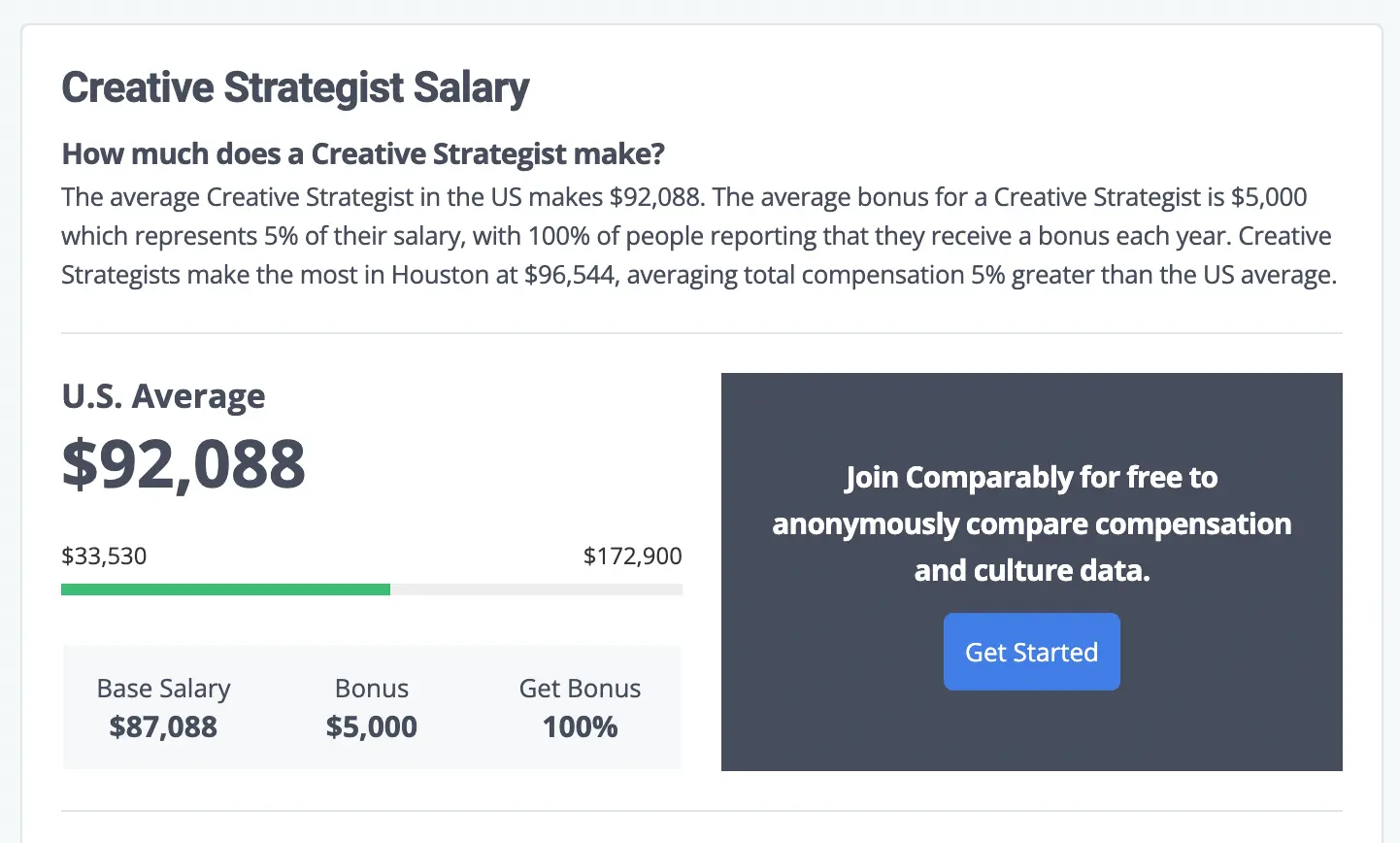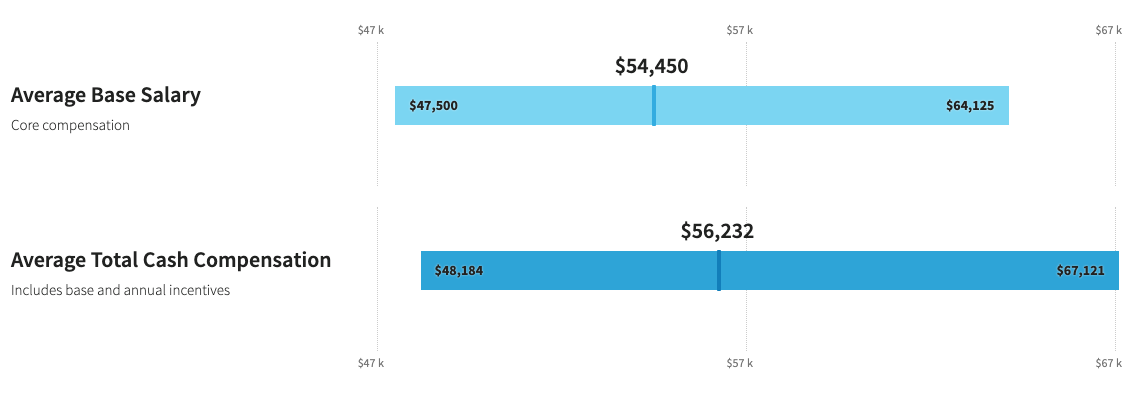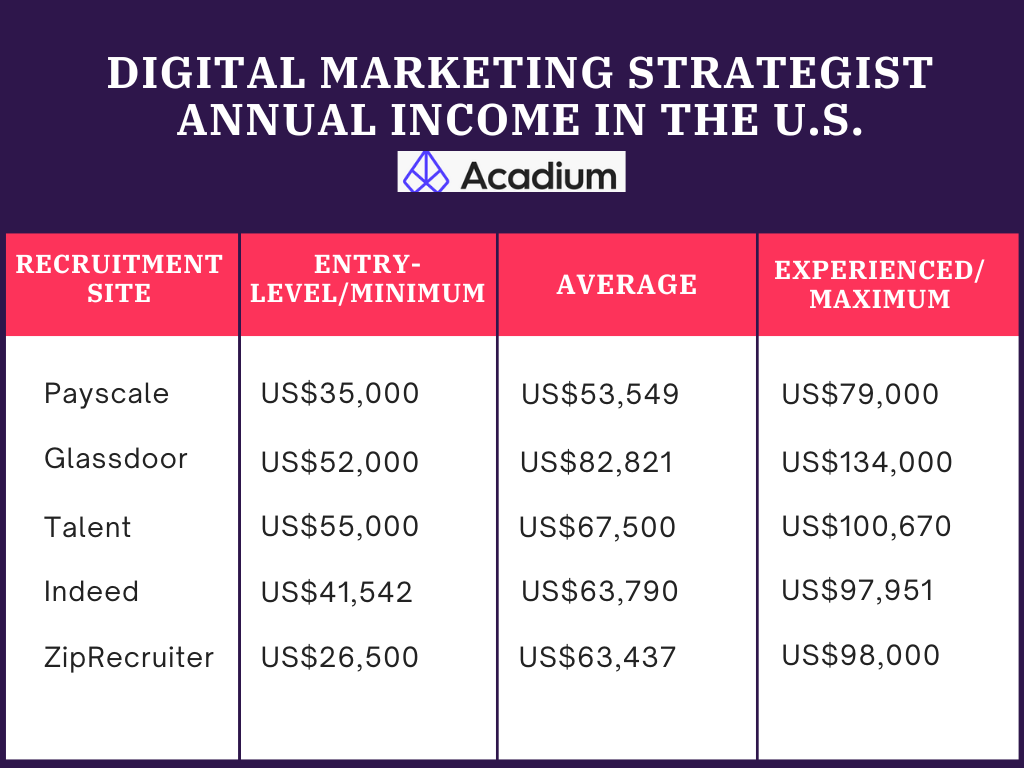Creative strategist salary is a topic that sparks curiosity and intrigue within the creative industry. In this comprehensive guide, we delve into the intricacies of this subject, exploring the factors that shape compensation and providing valuable insights to empower you in your salary negotiations.
From industry benchmarks to negotiation strategies, this guide serves as an indispensable resource for creative strategists seeking to maximize their earning potential.
Salary Expectations

Creative strategists can expect to earn a wide range of salaries, depending on their experience, industry, and location. Entry-level creative strategists with less than five years of experience can expect to earn an average salary of $50,000 to $70,000 per year.
Mid-level creative strategists with five to ten years of experience can expect to earn an average salary of $70,000 to $90,000 per year. Senior-level creative strategists with more than ten years of experience can expect to earn an average salary of $90,000 to $120,000 per year.
Factors that Influence Salary
Several factors can influence a creative strategist’s salary, including:
- Experience:Creative strategists with more experience can expect to earn higher salaries.
- Industry:Creative strategists working in high-paying industries, such as technology and finance, can expect to earn higher salaries.
- Location:Creative strategists working in large metropolitan areas, such as New York City and San Francisco, can expect to earn higher salaries.
- Education:Creative strategists with a higher level of education, such as a master’s degree, can expect to earn higher salaries.
- Skills:Creative strategists with in-demand skills, such as data analysis and digital marketing, can expect to earn higher salaries.
Industry Benchmarks

Understanding industry benchmarks for creative strategist salaries can provide valuable insights into compensation expectations and market trends. Let’s explore the salaries in different industries and identify factors that influence variations.
Overview of Job Market
The job market for creative strategists varies across industries, impacting salary expectations. Factors like the number of job openings, average salary, and growth prospects play a crucial role.
Salary Data
Based on industry research, here’s a table summarizing salary data for creative strategists:
| Industry | Number of Job Openings | Average Salary | Growth Prospects |
|---|---|---|---|
| Technology | High | $100,000-$150,000 | Strong |
| Marketing and Advertising | Moderate | $80,000-$120,000 | Steady |
| Nonprofit and Education | Low | $60,000-$90,000 | Limited |
Factors Influencing Salary Variations
In addition to industry, other factors can influence salary variations for creative strategists:
- Experience:Senior-level strategists with extensive experience command higher salaries.
- Location:Salaries tend to be higher in metropolitan areas with a high cost of living.
- Company Size:Larger companies often offer more competitive salaries and benefits.
- Skillset:Specialized skills, such as data analysis or digital marketing, can increase earning potential.
Geographic Variations: Creative Strategist Salary
Salary expectations for creative strategists vary across different regions due to several factors, including cost of living and availability of talent.
Regions with higher costs of living, such as metropolitan areas and coastal cities, tend to offer higher salaries to attract and retain skilled professionals. Conversely, regions with lower costs of living may have lower salary expectations.
Regional Salary Ranges
| Region | Salary Range |
|---|---|
| New York City | $120,000
|
| Los Angeles | $100,000
|
| San Francisco | $110,000
|
| Chicago | $80,000
|
| Dallas | $70,000
|
Factors Contributing to Variations
- Cost of living
- Availability of talent
- Industry demand
- Company size and budget
- Experience and skills
Visual Representation
[Insert bar chart or map showing salary differences across regions]
Experience and Skillset
Experience and skillset play a crucial role in determining a creative strategist’s salary. Those with more years of experience and a wider range of skills tend to command higher salaries.
Specific skills that are in high demand include:
Hard Skills
- Project management
- Digital marketing
- Data analysis
- Copywriting
- Graphic design
Soft Skills
- Communication
- Problem-solving
- Creativity
- Teamwork
- Leadership
Company Size and Culture

Company size and culture play a significant role in determining creative strategist salaries. Larger companies tend to offer higher base salaries due to their established reputation, resources, and ability to attract top talent. They often have structured compensation packages that include bonuses, equity, and other incentives.
Company culture, on the other hand, can have a more nuanced impact on salary expectations. Factors such as company values, work-life balance, collaboration, diversity, and employee recognition can influence how much creative strategists are willing to accept as compensation.
Company Values
Companies with a strong emphasis on creativity, innovation, and collaboration tend to attract creative strategists who value these aspects in their work environment. They may be willing to accept lower salaries in exchange for opportunities to work on challenging projects and make a meaningful impact.
Work-Life Balance
Creative strategists who prioritize work-life balance may be drawn to companies that offer flexible work arrangements, generous time-off policies, and a supportive work environment. They may be willing to trade higher salaries for a better balance between their professional and personal lives.
Collaboration and Teamwork
Companies that foster a collaborative and team-oriented culture can attract creative strategists who enjoy working with others and contributing to a shared vision. They may be willing to accept lower salaries if they feel valued as part of a team and have opportunities to grow and learn from their colleagues.
Diversity and Inclusion
Creative strategists who value diversity and inclusion may be more likely to seek out companies that prioritize these principles. They may be willing to accept lower salaries if they feel that the company is committed to creating a welcoming and inclusive work environment.
Employee Recognition and Rewards
Companies that recognize and reward their employees for their contributions can attract and retain creative strategists who feel valued and appreciated. This can take the form of bonuses, promotions, awards, or other forms of recognition.
Examples
Google:Known for its innovative culture, flexible work arrangements, and generous employee benefits, Google attracts top creative strategists who are willing to accept lower salaries in exchange for these perks.
Nike:With its strong emphasis on creativity, collaboration, and diversity, Nike attracts creative strategists who are passionate about working on iconic brands and making a meaningful impact.
Accenture:As a large consulting firm, Accenture offers competitive base salaries and bonuses to attract creative strategists who are looking for a challenging and rewarding career.
Benefits and Perks
Creative strategists often receive a range of benefits and perks in addition to their salaries. These benefits can impact overall compensation, employee satisfaction, and retention.
Health Insurance
Health insurance is a common benefit offered to creative strategists. It provides financial security and reduces stress, which can improve well-being and reduce burnout. Rising healthcare costs and expanding coverage options are industry trends. Telemedicine and virtual care options are innovative benefits that can enhance accessibility and convenience.
Paid Time Off
Paid time off allows creative strategists to maintain a healthy work-life balance and reduce burnout. It can increase job satisfaction and loyalty. There is a growing emphasis on mental health and well-being in the industry. Unlimited PTO or flexible work arrangements are innovative approaches to promote work-life balance.
Retirement Savings Plans
Retirement savings plans provide financial security in retirement. They can encourage long-term employee commitment. Increased contributions and matching options are industry trends. Employee stock ownership plans (ESOPs) are innovative benefits that can align employee interests with company success.
Professional Development Opportunities
Professional development opportunities help creative strategists enhance their skills and advance their careers. They can increase employee engagement and motivation. Personalized learning and mentorship programs are a focus in the industry. Tuition reimbursement and conference attendance are common benefits that support professional growth.
Employee Discounts
Employee discounts can reduce personal expenses, increasing employee loyalty and morale. Partnerships with local businesses and vendors are common. Exclusive discounts on company products or services are innovative perks that can enhance employee satisfaction.
Wellness Programs
Wellness programs promote physical and mental health. They can reduce healthcare costs and absenteeism. Mindfulness and stress reduction initiatives are gaining popularity in the industry. On-site fitness centers and wellness coaching are innovative benefits that can improve employee well-being.
7. Career Advancement Opportunities

As you progress in your career as a creative strategist, your salary expectations can change significantly. Promotions and increased responsibilities typically come with higher compensation.
Many organizations offer clear career paths for creative strategists, allowing for promotions to senior-level positions such as creative director or vice president of marketing. With each promotion, you can expect a substantial salary increase.
Career Paths
- Junior Creative Strategist to Mid-Level Creative Strategist: Typically involves a 10-20% salary increase.
- Mid-Level Creative Strategist to Senior Creative Strategist: Can result in a 15-25% salary increase.
- Senior Creative Strategist to Creative Director: Often comes with a 20-30% salary increase or more, depending on the organization and industry.
Bonuses and Incentives
In addition to salary increases, many organizations offer bonuses, incentives, and other benefits to reward employees for their contributions and encourage career advancement. These may include:
- Performance-based bonuses
- Profit-sharing plans
- Stock options
- Tuition reimbursement for professional development
Training and Development
To support career advancement, many organizations offer training and development programs to help employees develop the skills and knowledge needed for higher-level positions. These programs may include:
- Mentoring programs
- Leadership training
- Conferences and workshops
- Online learning platforms
Negotiation Strategies
Negotiating a higher salary can be a daunting task, but it’s essential to be prepared and confident in your worth. Here are some tips and strategies to help you get the salary you deserve:
Before you start negotiating, it’s important to do your research. Know what the average salary is for your position in your industry and location. You can use websites like Glassdoor and Salary.com to gather data. It’s also helpful to talk to people in your network who work in similar roles to get their insights.
Be Prepared
Once you know what you’re worth, it’s time to prepare for the negotiation. This means practicing what you’re going to say and anticipating the questions the employer may ask. It’s also helpful to have a list of your accomplishments and skills that you can refer to during the negotiation.
Be Confident
Confidence is key when negotiating a salary. Believe in your worth and don’t be afraid to ask for what you want. However, it’s important to be respectful of the employer’s budget and be willing to compromise.
Negotiate for More Than Just Salary
Salary isn’t the only thing you can negotiate for. You can also negotiate for benefits such as vacation time, sick leave, and retirement benefits. It’s important to prioritize your needs and negotiate for the things that are most important to you.
Don’t Be Afraid to Walk Away
If you’re not happy with the employer’s offer, don’t be afraid to walk away. There are plenty of other jobs out there, and you should only accept an offer that you’re happy with.
Salary Comparison Tools

In today’s job market, it’s more important than ever to know your worth. That’s where salary comparison tools come in. These online resources can help you research salary expectations for your specific role, location, and experience level.
There are a number of different salary comparison tools available, so it’s important to do your research and find one that’s reputable and provides accurate data. Some popular salary comparison tools include:
- Salary.com
- Glassdoor
- LinkedIn Salary
- Indeed Salary Calculator
- Payscale
Once you’ve chosen a salary comparison tool, you can start researching salary expectations for your specific role. Simply enter your job title, location, and experience level into the tool, and it will provide you with a range of salaries that you can expect to earn.
Using Salary Comparison Tools Effectively, Creative strategist salary
Here are a few tips for using salary comparison tools effectively:
- Use multiple tools to get a more accurate picture of salary expectations.
- Consider your experience level and skillset when comparing salaries.
- Don’t be afraid to negotiate your salary based on your research.
Market Trends

The creative strategy landscape is constantly evolving, driven by technological advancements, changing consumer behaviors, and emerging industry trends. These dynamics have a significant impact on creative strategist salaries and career prospects.
One key trend is the increasing demand for data-driven insights and analytics in creative strategy. As brands seek to maximize the effectiveness of their marketing campaigns, they are turning to data to understand their target audience, track campaign performance, and optimize their strategies.
The average salary for a creative strategist can vary depending on factors such as experience and location. However, those working in the field of creative pediatric dentistry may have the opportunity to earn higher salaries due to the specialized nature of their work.
Creative strategists in this field are responsible for developing and implementing marketing campaigns that target children and their parents. They must have a strong understanding of child psychology and be able to create engaging and effective content that appeals to both audiences.
As a result, creative strategists in this field are in high demand and can command higher salaries.
Impact on Salaries
- Creative strategists with strong analytical skills and experience in data interpretation are in high demand, commanding higher salaries.
- The ability to leverage data to create effective and targeted campaigns is becoming an essential skill for creative strategists.
Other Emerging Trends
- The rise of digital and social media platforms has created new opportunities for creative strategists to engage with consumers.
- The increasing importance of user experience (UX) design has led to a growing demand for creative strategists with expertise in this area.
- The shift towards sustainability and ethical practices has created a need for creative strategists who can develop campaigns that align with these values.
Case Studies
Real-world case studies can provide valuable insights into successful salary negotiations. Here are two examples of creative strategists who successfully negotiated higher salaries:
Case Study 1
A creative strategist with 5 years of experience was negotiating a salary for a new role. She had strong research and analytical skills, a deep understanding of consumer behavior, and a proven track record of developing successful marketing campaigns. She researched industry benchmarks and comparable salaries for similar roles.
She also prepared a portfolio of her work and case studies demonstrating her impact on business outcomes. During the negotiation, she confidently presented her value to the company and was able to negotiate a salary that was 15% higher than the initial offer.
Case Study 2
A senior creative strategist with 10 years of experience was negotiating a salary for a new role at a large tech company. He had a strong reputation in the industry, had led several award-winning campaigns, and had a proven track record of driving revenue growth.
He approached the negotiation with a collaborative mindset and focused on building a mutually beneficial relationship with the company. He emphasized his ability to solve complex business problems and his commitment to the company’s mission. As a result, he was able to negotiate a salary that was 20% higher than the initial offer, along with a generous bonus and equity package.
Create a table or chart that projects salary expectations for creative strategists over the next 5-10 years, broken down by experience level and industry.
Salary expectations for creative strategists are projected to increase over the next 5-10 years. This is due to the growing demand for creative professionals in various industries.
The following table projects salary expectations for creative strategists by experience level and industry:
| Experience Level | Industry | Salary Expectation |
|---|---|---|
| Entry-level | Advertising | $50,000-$70,000 |
| Mid-level | Advertising | $70,000-$100,000 |
| Senior-level | Advertising | $100,000-$150,000 |
| Entry-level | Marketing | $45,000-$65,000 |
| Mid-level | Marketing | $65,000-$90,000 |
| Senior-level | Marketing | $90,000-$120,000 |
| Entry-level | Technology | $55,000-$75,000 |
| Mid-level | Technology | $75,000-$110,000 |
| Senior-level | Technology | $110,000-$160,000 |
Salary Structure
The salary structure for creative strategists can vary depending on several factors, including experience, industry, and company size. The most common salary structures are:
Fixed Salary
With a fixed salary, creative strategists receive a set amount of compensation each pay period, regardless of the number of hours worked or the performance of the company. This structure provides a stable and predictable income, but it may not offer the same potential for high earnings as other structures.
Commission-Based Salary
Under a commission-based salary structure, creative strategists earn a percentage of the revenue generated by their work. This structure can offer the potential for high earnings, but it also comes with more risk, as income can fluctuate based on performance.
Bonus-Based Salary
A bonus-based salary structure typically involves a fixed base salary plus a bonus that is tied to the performance of the individual or the company. This structure can provide a balance between stability and the potential for additional earnings.
Pros and Cons of Different Salary Structures
Each salary structure has its own advantages and disadvantages. Here is a brief overview:
- Fixed Salary:Pros – Stable and predictable income, less risk. Cons – Limited potential for high earnings.
- Commission-Based Salary:Pros – High earning potential, performance-based rewards. Cons – Income can fluctuate, more risk.
- Bonus-Based Salary:Pros – Balance between stability and potential for additional earnings, rewards performance. Cons – Bonuses may not always be guaranteed.
The best salary structure for a creative strategist will depend on their individual circumstances and career goals.
Negotiating a Contract as a Creative Strategist

Negotiating a contract as a creative strategist requires careful planning and a deep understanding of the industry. Here are some tips and strategies to help you secure a favorable agreement:
1. Know Your Worth: Research industry benchmarks and your own experience and skillset to determine a fair salary range. Consider your value to the company and the potential impact of your work.
2. Be Prepared: Gather all necessary documents, such as your portfolio, resume, and references. Prepare a clear and concise proposal outlining your deliverables, timelines, and budget.
3. Negotiate Key Terms: Focus on negotiating the most important terms, such as compensation, ownership of intellectual property, termination clauses, and dispute resolution mechanisms.
4. Seek Legal Advice: Consider consulting with an attorney who specializes in creative contracts to ensure that your interests are protected.
5. Be Flexible: While it’s important to stand your ground on key issues, be willing to compromise on less important matters to reach an agreement.
Important Clauses and Terms to Consider
The following table Artikels key clauses and their implications in creative contracts:
| Clause | Implication |
|---|---|
| Scope of Work | Defines the specific deliverables and responsibilities of the creative strategist. |
| Compensation | Artikels the payment terms, including salary, bonuses, and expenses. |
| Intellectual Property | Determines who owns the rights to the creative work produced under the contract. |
| Termination | Specifies the conditions under which the contract can be terminated and the consequences of such termination. |
| Dispute Resolution | Artikels the process for resolving disputes that may arise during the course of the contract. |
Ethical Considerations
When negotiating your salary, it’s important to keep ethics in mind. Transparency and fairness are key to ensuring that both parties feel respected and satisfied with the outcome.
Unethical behavior in salary negotiations can include:
- Lying about your experience or qualifications
- Making false promises
- Threatening to leave the company if you don’t get your desired salary
- Using underhanded tactics to pressure the other party
These behaviors are unethical because they violate the trust between the parties involved and can lead to a negative work environment.
HR plays an important role in ensuring ethical salary negotiations by:
- Providing guidance to both employees and managers on ethical salary negotiation practices
- Mediating salary negotiations between employees and managers
- Investigating and addressing any complaints of unethical salary negotiation practices
You can avoid unethical behavior in salary negotiations by:
- Being honest and transparent about your experience and qualifications
- Negotiating in good faith
- Being respectful of the other party
- Avoiding threats or ultimatums
Expert Answers
What factors influence creative strategist salary?
Factors that influence salary include experience, industry, location, company size, and skillset.
How can I negotiate a higher salary as a creative strategist?
Tips for negotiating a higher salary include researching industry benchmarks, preparing thoroughly, being confident and assertive, and leveraging your unique skills and experience.
What are common benefits and perks offered to creative strategists?
Common benefits and perks include health insurance, paid time off, retirement savings plans, professional development opportunities, employee discounts, and wellness programs.